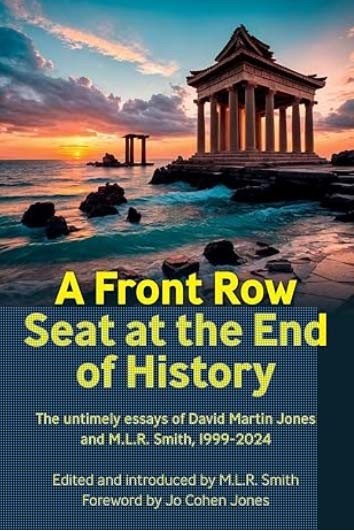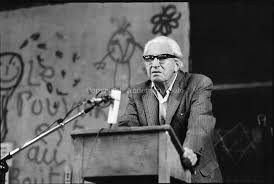Bruges Group Blog
To paraphrase a saying from the Second World War, when some citizens seemed blissfully ignorant: 'there's a revolution on, you know!' Throughout my lifetime there has been no major war, but by stealth there has been a radical overturning of conventional society and its institutions and norms. This has now reached a Woke crescendo, and in Orwe...
Football clubs are valuable social assets. Their heritage typically goes back to the late Victorian period, when football emerged as the most popular sport of the working class. They have had close association with other local enterprises, particularly breweries (McCrae, 2008), and club directors were often significant employers in the area. ...
Is the World Economic Forum's annual shindig in the Swiss Alps becoming an embarrassment?As more and more people wake up to the hypocrisy of those preaching from the podium and the dystopian designs of the Great Reset, the air is chilling. Yet the show must go on. The WEF may be floundering, as observed by James Pinkerton in the 'Rise and Fall of D...
On 7th January 2022, as the new law requiring NHS staff to be 'fully vaccinated' against covid-19 came into force, Health Secretary Sajid Javid was visiting King's College Hospital in London. Meeting some clinical staff, he was challenged by consultant Steve James, who calmly and rationally explained why the 'no jab no job' policy is nonsensical. D...
First do no harm, states the Hippocratic Oath. In the coronavirus pandemic, medical experts here and in several European countries prescribed lockdown. Yet this was not evidence-based practice, and it may indeed have been more harmful than the virus itself. In hospitals across the country, doctors and nurses are working tirelessly as a surge of cor...
A good education is a ticket in life. Graduation at a prestigious university followed by a professional career, all the hard work rewarded with a steadily rising salary, a nice home and exotic holidays. But material wealth isn't everything. The privileged middle class assumes moral superiority, as expressed in values such as 'no borders', the fads ...
Eighty minutes on the clock, and after some dubiously-awarded penalty kicks, the side in blue shirts with yellow stars is on the cusp of victory. In a moment of high drama, Boris Johnson grabs the ball and makes one last desperate lunge. Forcing his way through the serried ranks of naysayers, he gets the ball over the line. Brexit at last? We live ...
In their positions of power and privilege, Remainers have always assumed that they are right, and that they will win. This is particularly so in London, where the gospel is preached daily by George Osborne's Evening Standard. But since 29th March, when the government failed on its promise to leave the EU as stipulated by Article 50, the mood around...
Theresa May is at the weakest yet most dangerous stage of her miserable leadership. The scheduled European election might not happen if May overcomes resistance to the Withdrawal Agreement, which has hardly changed since first presented. It was at Chequers that the Cabinet was first told of the thin gruel on offer. Brexit secretary David Davis havi...
They had one job….Amidst the fury in the Conservative Party at Theresa May's overt betrayal of the Brexit vote, Wayne Fitzgerald, deputy leader of Peterborough council, told the Telegraph of a large number of constituents 'who will not vote for any Labour politician, Conservative politician, anybody other than an anti-EU party'. This is an area tha...
Oh, the irony. All that conspiracy theory about Kremlin interference in the EU referendum, and now the desperate Remain campaign cheats our public petitions website by encouraging signatures from anywhere in the world. Russians are aplenty among the millions of petitioners urging revocation of Article 50. Nigel Farage is rightly asking why this for...
Saluton! The contrived language of Esperanto, thought to have disappeared into the mists of time, is alive and kicking. And it is on the cusp of gaining official recognition by the EU. Devised in 1887 by Ludwig L Zamenhof, an eye doctor and Ashkenazi Jew in the Tsarist empire, Esperanto merged multiple European tongues into one grammatically ration...
An interview with Dr Ted Malloch by Bruges Group writer Niall McCrae Ted Malloch, CEO of Roosevelt Global Fiduciary, has served as research professor at Yale University, senior fellow at Said Business School at Oxford University, and professor of governance and leadership at Henley Business School. His most recent books concern practical wisdom in ...
'Politics is broken', boomed the Times, after a series of defections from both Tory and Labour parties. Angela Smith, one of the Labour breakaways, said that 'the level of alienation from the political process is at a record high'. Fair point, but false analysis. Opinion polls indeed show increasing distrust of our parliamentarians, but arguably th...
A new pro-Brexit party, approved by the Electoral Commission, has been founded in response to the reluctance of Parliament to honour the verdict of the EU referendum. Nigel Farage, former leader of UKIP, declared in the Daily Telegraph that if Britain's exit from the EU is delayed, he will stand as candidate in the European Parliament elections: 'I...
We're all global now. In our use of the internet, in the clothes and food we buy, and in our increasingly multicultural society. But that doesn't make us globalists. Boundaries are important in all walks of life, from the professional register that confirms the status of a doctor or lawyer to the catchment area of eligibility for services. Otherwis...
Cheekily, Remainers try to co-opt revered British historical figures to bolster their cause. For example, in the week of the EU referendum a poster of Winston Churchill was fixed to every lamppost on Waterloo Bridge, with the slogan 'Brits don't quit' (swiftly removed and ripped by yours truly). Any prominent people from the past may be deployed, i...
Okay, we know Hampstead champagne socialist Polly Toynbee is an incorrigible Remainer. No news there. But her latest tweet about a so-called People's Vote (the losing side's determined effort to reverse the 2016 referendum result) has gone beyond the pale - even for many of her fellow Remain followers. Here is her dehumanising tweet, celebrating th...
'It's time to think the unthinkable on Brexit' argues pro-EU Tory MP Sam Gyimah. 'It is no exaggeration to say we face the greatest political and constitutional emergency we've had in peacetime. This is not in response to any external threat or challenge. The tragedy is we have done this to ourselves. But because of that, we can step back fro...
Quelle difference! The tremendously effective protests throughout France against the arrogant and aloof president Emmanuel Macron began as a reaction to higher diesel taxes. For the gilded elite in Versailles to impose an environmental policy that would impoverish an already struggling populace was the straw that broke the camel's back. Macron was ...
'If there is a no-deal Brexit it will be the worst thing that has happened to British universities in modern history'. So said Simon Marginson, professor of higher education at Oxford University, in a Guardian report on a letter by academic leaders three months before the withdrawal date. The EU represents progress, and Britain the past of empire a...
Hysteria is a taboo word nowadays. Derided for its original concept of female volatility wreaked by hormones, it also offends the postmodern elevation of emotional truth. Yet the feminist #MeToo movement, a moral panic of gender grievance, is becoming a case study of mass hysteria. Consider the reaction to the appointment of judge Brett Kavan...
Bright blue flags with the circle of yellow stars, hoisted with the hubris of progressive post-nationalism. The colours don't seem quite right, do they? In London, foreign tourists flock to our historic buildings, where the theme is red, white and royal blue. However, stand across the road from the Remain vigil at Westminster, defiantly waving your...
If - and that's a big if - there were a parliamentary decision in favour of a fresh referendum on the EU, how should the Leave majority respond? Let's ask recalcitrant Remainers to put themselves in our shoes. What incentive would there be to vote again? What faith could Leavers have in the system, if they overcame the odds stacked against them for...
Anyone remember Watney's Red Barrel? This ubiquitous, tasteless brew was a product of the overhaul of the British brewing industry in the 1960s and 70s, as the plethora of local breweries steeped in heritage were systematically bought out by the 'Big Six' of Bass Charrington, Whitbread, Watney Mann, Scottish & Newcastle, Allied and Courage. Up ...
The phenomenon of fake news has become a major story in itself. CNN constantly dishing the dirt on Donald Trump with no pretence of impartiality; the Guardian blaming Russian interference for Brexit; conspiracy theories abound. Economy of truth and sensationalism are not new, but undoubtedly the problem has worsened with the internet, which has spa...
Mass media, according to a letter sent to the government of Poland, 'are the property of the whole human family. Everybody has a right to use them'.This was not a complaint to the allegedly dictatorial Law & Justice party of today, but to the bluntly oppressive communist regime in 1978. The bishops of that traditionally Christian land, whose pe...
The price of a pint is stretching the working man's wallet too far. The results of excessive taxation are plain to see, with more and more pubs closing down and replaced by flats, a convenience store or an Islamic centre. These metamorphoses are a sign of the times: the rising population (with particular growth of largely teetotal Muslim communitie...
In the aftermath of both the Genoa bridge collapse and the Grenfell Tower fire in 2017, left-wing politicians and media were quick to scandalise their political opponents, ranging from sociological critique of callous capitalism to blunt reference to the 'fascist' Italian government or a Tory cull of the poor. Coverage of the Genoa calamity in the ...
The 'silly season', they call it - when Parliament has closed for the summer holidays, and the newspapers scramble for titbits. Last week the media pounced on a commentary by the recently-resigned Foreign Secretary Boris Johnson, the flaxen-haired politician pretending to be an essayist (or is it the other way round?). Don't ban the burqa, Boris wr...
What is meant by treachery, and is it applicable to our establishment's sell-out to the EU? Conservative party members have been using the term about their leader Theresa May. Also implicated is the head civil servant of the Cabinet Office Europe Unit, Olly Robbins. Arguably, Robbins has been entreating to a foreign power, and is thus guilty of mis...
A comfort zone gives the comforted a false sense of safety. For now, it would be quite possible to carry on as if nothing significant has changed: assuring messages from Conservative Party HQ; 'crisis – what crisis' coverage on the BBC or comment pages of the Times; social media bubbles where agreeable opinions are heard. But believe us at th...
To state that a book is important may seem a cliché, but Frank Furedi's Populism and the European Culture Wars is undoubtedly so. Using Hungary as a case study, no writer has more clearly described the predicament of national culture and identity, set against the progressive EU goal of a borderless, multicultural continent. Yet the message is unlik...
Two rallies in London couldn't more starkly contrast the class divide in Britain. I was at the #FreeTommy demonstration on 9th June, a massive gathering in support of the jailed campaigner against child rape gangs. Legions of mostly white working-class blokes with a cause celebre. Inevitably a boorish element provided the material for damning...
The Day for Freedom, in London on 6th May, was a showcase of characters I have followed and featured in my articles: for example, Milo and Sargon of Akkad. So I didn't want to miss it. Sadly, this invigorating and necessary event was either ignored by the mainstream media, or described by the contemptuous Guardian as a 'far-right rally'. Certainly ...
Never underestimate the talent of Remain in scoring own-goals. Tony Blair claiming to be the rebel with a cause; Lord Adonis accusing the BBC of Brexit bias (cough, splutter); and Ian McEwan urging a second referendum because the stubborn oldies will soon be dead. These anti-democrats pollute the airwaves with their verbal farts, but as opinion pol...
How can the younger generations be enticed away from the group-think that defines the EU as a paragon of virtue? They won't be persuaded by Leave-supporting politicians or mainstream media, but they might listen to Sargon of Akkad. This is the YouTuber from Swindon, real name Carl Benjamin, who has taken his cyber-sword to the stifling so-called 'p...
A humiliation worse than Suez, warns Jacob Rees Mogg. He was referring to the transition deal with the EU, which does not return a single power to Britain as we officially leave the EU in March next year. He could have used the same phrase for the passport fiasco, as our leaders have awarded the contract to a Dutch-French company instead of a respe...
On a grey winter day in 1972, Air Force One touched down on Chinese soil. Although little tangible benefit came of President Nixon's surprise visit to Chairman Mao and the impenetrable communist state, it was one of the most theatrical acts of diplomacy in modern history. And it was recognised in the opera 'Nixon in China' by John Adams. Perhaps Ad...
Leavers often wonder whether a Remain win would have aroused anything like the rancour and resistance we are experiencing today. So here's another scenario, as a thought experiment. After a 52-48 verdict to stay in the EU, Cameron's government is riven with internal conflict. A snap election is called, UKIP gets enough votes to hand dozens of seats...
For a Brexit-supporting minority in academe, here is an illustration of what we're up against. Last year I was invited by the editor of International Journal of Nursing Studies to write a commentary on Brexit and the NHS. This would be published alongside a staunchly anti-Brexit argument, by Professor Martin McKee of the London School of Hygiene &a...
Back in the early days of my mental health career, I first came across common law in the form of two handles on a door. To leave the psychogeriatric ward, both the lower and upper handle (the latter at head height) were operated simultaneously. This ploy was to prevent confused residents from going out and possibly getting chilled to the bone, lost...
The tentacles of the Stop Funding Hate campaign reach far and wide. En route to the station, I would sometimes stop at a nearby café, reading their copies of the Sun and Daily Mail over a coffee. The cafe gets most of its trade from mums on the school run, and you wouldn't think this quintessentially suburban setting would be fertile soil for polit...
£40 billion isn't enough. The EU, facing a gaping hole in its finances after losing its British cash cow, is extorting to the max. But even the most generous offer from our pathetic political leaders, in return for a few cake crumbs, won't guarantee a mutually-rewarding trade deal. The whole protracted and humiliating process could be voted down by...
Cars have always been more than four-wheeled transport; they're status symbols. Owners of a Ford Focus, a 'Chelsea tractor' or a quirky Citroen display something of their character, and their wealth. In the past, cars were also expressions of patriotism. A proud ex-serviceman would insist on a staid black or beige Austin or Hillman, but by the 1970...
A clumsy request from a parliamentarian on what is taught about Brexit in universities has caused uproar. Chris Heaton-Harris, MP for Daventry and a junior Conservative whip, was suddenly likened to Senator Joseph McCarthy, who infamously led a campaign to root out 'reds under the bed' in American institutions back in the 1950s. But incredulous cla...
By Niall McCrae
Chief commissioner Michel Barnier wags his finger at the media conference. An uprising in a major European country has forced his hand, as attacks on police and politicians lead to desertions and defections. Unlike the British government, which was pummelled into submission over the Brexit deal, these plucky secessionists are undermining the authority of the formidable Eurocrat. So he threatens to send in the EU Army.
It’s 2027, and the EU is more powerful than ever, yet also more detached. It reigns supreme in the cosmopolitan cities, in the financial centres, and on university campuses: Berlin, Heidelberg, den Haag, Frankfurt-am-Main, Gothenburg, Barcelona, Fiorentina. These islands of the liberal intelligentsia look condescendingly on the masses, whose unpredictable and uninformed votes put progress in peril come each election. The provincial hinterlands are stifled by backwardness, with rising tension between nostalgic nationalism and expanding ethnic enclaves. Among the commoners, rule by Brussels is at best tolerated, at worst despised.
Consulting historians, political commentators begin to see what the EU has become: a latter-day Holy Roman Empire. And Barnier and fellow commissioners are behaving like the ‘enlightened despots’ of the European past.
The HRE was a revival of the old Roman Empire, but with papacy to the fore. Founded in AD 800 when the Pope crowned Charlemagne as emperor, its domain comprised France, Germany and most of modern-day Italy. After the French left in the tenth century, and the Italian parts were given away, the empire centred on Germany. Successive emperors looked east to expand their territory; the pagan Prussians, Slavs and Balts were suppressed by brute force, and fiefdoms were established in Hungary, Poland and Bohemia. But the intent to rule Europe was confronted by the forces of national identity, the Reformation and Thirty Years War, and the HRE gradually retreated to a federation of principalities.
Contact us
246 Linen Hall, 162-168 Regent Street
London W1B 5TB
Director : Robert Oulds MA, FRSA
Founder Chairman : Lord Harris of High Cross













